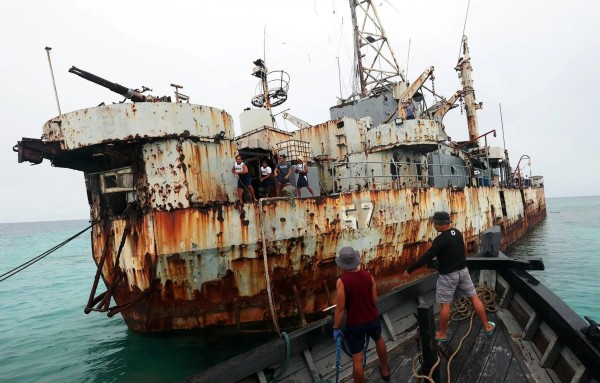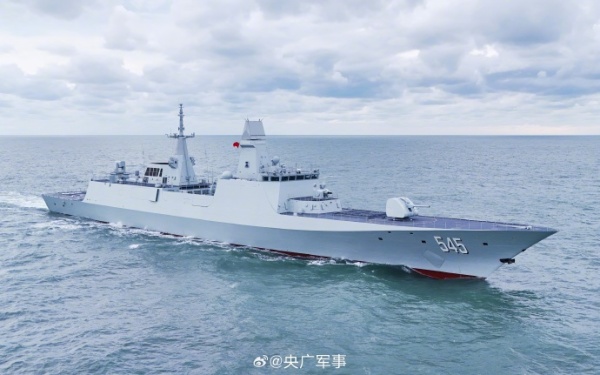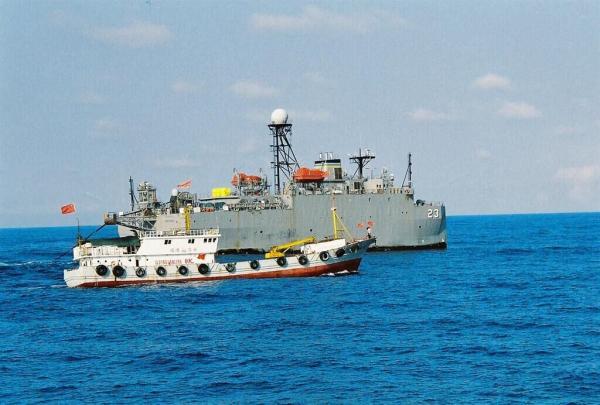编者按:日前,YouTube播出美国独立记者丹尼·海防(Danny Haiphong)对清华大学战略与安全研究中心研究员周波的专访,已获超10万观看。专访中,海防就中国人民解放军的军队建设及目标、中菲关系、南海、台海局势等问题向周波提问采访。丹尼·海防是美国颇具知名度和影响力的左翼媒体人之一。他以独立记者身份在YouTube运营视频节目,发布对知名人士的专访,已经有超过37万订阅者。现由北京对话将采访第一部分实录翻译如下:
【翻译/王樟宸、李泽西;核译/ 刘松瑀】
海防:非常感谢周波先生今天接受采访。对于可能不太了解您的观众,您目前在清华大学战略与安全研究中心担任研究员,曾经是中国人民解放军的大校。今天我们有许多问题需要探讨,尤其是对于美国和西方的观众来说,在中美关系以及中国在全球角色的问题上,仍然存在很多误解,特别是在地缘政治和军事层面。
我们先从南海和菲律宾的问题谈起。最近一段时间,西方媒体多次提到南海局势紧张,包括中国与菲律宾的冲突和对峙。我想请您谈谈,您如何看待这些紧张局势?中国在南海的立场是什么?中国和菲律宾之间究竟发生了什么?
周波:谢谢。你提了几个很好的问题,确实不容易用简单几句话回答,但我会尽量简明扼要。
首先,当像中国这样的大国和像菲律宾这样的小国发生矛盾时,人们往往本能地会对小国产生更多同情。这是人之常情,就像人们总觉得小黄瓜或小番茄更加可爱、更具吸引力一样。我理解这种感受。但是,让我告诉你一个鲜为人知的事实:菲律宾曾在2000年、2006年和2013年三次杀害来自大陆和台湾的中国渔民,而中国在这些事件中从未对菲律宾使用过武力。如果人们了解这些事实,也许他们的看法会有所改变。
1999年,菲律宾政府故意将一艘二战时期的老旧军舰搁浅在仁爱礁。中国对此提出了抗议,尽管菲律宾政府做出了各种承诺,但始终以"技术困难"为借口未能将其移走,导致这一问题至今未得到解决。 想想看,考虑到中国人民解放军的强大军力,如果我们真打算通过武力来解决这个问题,岂不是轻而易举的事?简单来说,如果中国政府和军队没有保持克制,菲律宾海军陆战队的士兵怎么可能在那艘搁浅的军舰上待上整整25年?

1999年,菲律宾政府故意将一艘二战时期的老旧军舰搁浅在仁爱礁 资料图
的确,中国海警船曾经使用过水炮。从电视转播上看,这种画面可能会显得非常"激烈",尤其是当对方是一个小国时。然而我想强调的是,这恰恰是因为中国不想动用武力,所以才采取了这种威慑手段,目的是阻止菲律宾海岸警卫队向搁浅军舰运送物资,防止其被加固成一个永久性的基地。
海防:您这个视角与我们在西方媒体中看到的叙述有很大不同。西方舆论常常描述中国在南海抱有"侵略性的野心",并且由于中国是大国,争端的责任常常被完全归咎于中国。然而,这些争议充满误导,我认为普通美国人可能并不了解其中的真相。对此,您有什么看法?
周波:西方媒体常常声称中国想把南海变成"中国的内湖",但这并不属实。中国政府的立场是,南海的所有岛屿和岩礁都是中国的领土。凭借这些领土,中国自然可以根据国际法主张领海、毗连区和专属经济区的权利。但这并不意味着我们主张拥有全部南海。这才是中国的立场。
此外,西方常用"侵略性的"和"胁迫性的"这样的词来形容中国的行为,但事实上没有任何证据表明中国在南海使用过武力,甚至连威胁使用武力的行为都没有。中国和东盟国家正在就南海行为准则进行谈判。尽管这一进程比预期的慢,但我认为这不是任何一方的错。并且人们常常忽视一个事实:东盟声索国之间本身就存在争议。一旦讨论南海问题,人们就立即将其视为中国与其他声索国之间的问题,我认为这是不公平的。
海防:您提到过中国海警使用水炮的情况,并在以往接受采访时强调,中国此举是为了防止更大的冲突产生,而不是推动局势升级。然而也有报道提到像菲律宾和中国船只发生碰撞这样的事件。像CNN这样的西方媒体通常将这些事件描述成中国在加剧冲突。您对这些事件了解多少?
周波:当两艘船靠得很近时,总有碰撞的风险。如果一艘船试图阻止另一艘船前进,也会发生碰撞。我不会指责是哪一方导致了碰撞,因为双方都在努力阻止对方实现各自的目标。
不过,退一步来看,我认为南海不会发生很严重的冲突。这在一定程度上是因为中国在军力上具有压倒性优势,让我们能够控制局势。此外,中国已经承诺不在南海使用或威胁使用武力,其他声索国也做出了类似的承诺。
因此,我最希望的是大自然的"不可抗力"会最终解决这些问题。以仁爱礁那艘搁浅军舰为例,如果双方都不动武,随着时间推移,这艘船会自然生锈和解体,这种结果可能会符合所有人的利益。
海防:您提到中国的军事力量具有压倒性优势。西方对中国的军事实力存在很大误解,常常将其描述为一种"威胁"。作为一名退役的中国人民解放军大校,您能否谈谈中国的军事实力?是否如西方媒体所描述的那样构成了威胁?
周波:这是个很有意思的问题,有时候我自己也很难给出明确的结论,还需要思考一下。中国人民解放军的发展当然是非常迅速的,但自1979年以来,解放军就没有打过仗。这就引出了一个关键问题:解放军能打胜仗吗?
答案是肯定的。自中华人民共和国成立以来,中国几乎每十年都打一次仗,直到1979年对越自卫反击作战,这是最后一次。之后,中国的重心就转向了经济发展。这种转变实际上为中国增强军事力量提供了经济资源。
为了更直观地理解,我们可以把中国人民解放军与俄罗斯军队进行比较。在俄乌冲突前,世界普遍认为俄罗斯的军队是仅次于美国的第二强大军队,甚至在某些方面不相上下。然而,解放军的预算是俄罗斯的三倍,尽管仍然是美国的四分之一。解放军还拥有世界上规模最大的常备陆军和舰艇数量最多的海军。

054B首舰正式服役 央广军事
中国正在不断研发最先进的武器,其中一些的先进程度甚至超过了俄罗斯。总的来说,中国提出打造"世界一流军队"的目标是合乎逻辑的,并且已经宣布,计划在2049年实现这一目标,现在我们正在加速推进这一进程。
这里还有两个问题:什么是"世界一流军队"?中国如何在国防预算仅占GDP 1.5%的情况下(低于北约2%的GDP标准)实现"世界一流军队"的目标?
对于第一个问题,在我看来,"世界一流军队"的定义因人而异。如果我们认为仅有美国是"世界一流军队",那么中国还有很长的路要走。然而,如果"世界一流军队"不止一支,那么许多人已经将中国人民解放军视为其中之一。
我们暂且假设只有美军是"世界一流军队",而中国还有很长的路要走;即便如此,解放军也有许多优势。首先是中国上下一心,众志成城打造"世界一流军队"的政治决心,这也不是什么秘密。其次,中国的军费开支是可持续的,并且是俄罗斯的三倍,总额为全球第二,且中国军队背靠全球最大的工业制造国。中国的造船能力是美国的200倍以上。因此我们满怀信心。
尽管如此,还存在一个根本性的困境:在不参与冲突的情况下,如何证明中国人民解放军的"世界一流"水平?我认为道理很简单:假如你有一把利剑,你当然会希望它很锋利,但你不会去砍掉别人的头来测试它的锋利。中国正是因为40多年的和平,才得以实现经济增长,让8亿人摆脱了贫困。这种和平是无价的,也是我们努力维护的目标。
这对世界来说意义重大;纵观世界历史,鲜有如此和平的新兴强国。西方称中国具有"侵略性"和"胁迫性",但给不出任何实例。唯一的一起事件是中印士兵在边境发生冲突,但这场冲突是以石器时代的方式斗殴,双方都知道不能朝对方开枪。
海防:当我们提起战争的时候,往往会讨论胜算率。然而,中国长期的和平确实让评估军事实力变得更加困难。这就引出了另一个问题。近年来,与美国军方关系密切的智库,比如兰德公司和新美国安全中心进行了许多涉及中国的战争推演。您如何看待中国的战备情况,尤其是与美国潜在的冲突?这些战争推演通常指向更为悲观的结果,您如何看待这些战争推演及其意义?中美之间可能会在哪里爆发冲突?
周波:我知道美国智库进行的这些战争推演,但我建议大家不要轻易相信推演的结果;不能因此就假设中国军事一定占优。
在讨论中美潜在的冲突场景时,主要涉及两个区域:南海和台湾海峡。在这两者中,我认为南海的风险更高;我在南华早报发表的文章《是南海,笨蛋!》中写过相关内容。
美国在南海频繁地活动,例如进行海军巡逻、抵近侦察和"航行自由"行动,中国在完全控制局势方面面临挑战,即中国无法制止这些活动。这些行动经常被媒体炒作放大,实际上美国每年对大约15个国家开展此类行动约20到21次,其中只有1到2次是针对中国的。
尽管如此,无论在海上还是空中,频繁的抵近侦察和监视活动都会增加危险对峙的风险。中国将这些行为视为对主权和领土完整的威胁,而美国则认为这是行使航行自由的常规行动。2013年我曾带领中国代表团赴五角大楼与美方官员讨论相关法律问题,但我们始终未能达成共识。国际海洋法的模糊性足以让双方找到合理化各自立场的依据,有时甚至互相援引同一条例唇枪舌战。

美国海军"无瑕号"监听船和中国渔民对峙 资料图
如果解放军实力持续增强,中国对这些被视为挑衅行为的容忍度可能会降低。五角大楼的报告显示,两年来有超过180次拦截事件,即大约每四天就发生一次。尽管我希望能够通过和平方式解决问题,但不排除又有一次碰撞事件为双方敲响警钟。
在南海,这些事情是难以避免的。台湾海峡的问题则不同。台湾无法搬走,随着中国人民解放军的发展壮大,无论台湾当局如何继续其分裂主义行径,我相信时间在我们一边。
核心问题是,美国是否会进行干预。鉴于美国实行战略模糊政策,我给不出答案。不过,对美国来说,中国制造了更大的战略模糊,即,中国是否会使用武力?美国将军们绞尽脑汁,不断猜测。
不过,我想引用美国国防部长奥斯汀去年在香格里拉对话会上的讲话:"冲突并非迫在眉睫或不可避免"。我高度重视奥斯汀的这番言论,并将其写入了我在《外交事务》上发表的文章中,因为他的讲话具有权威性。他不仅是美国最高级别的国防官员,而且理论上他的言论应该得到了情报的支持。他直接否定了一些美国将军的猜测,表现出对两岸局势的信心,而中方仍在谈论和平统一。使用武力不是必然的,我们仍然对最好的结果抱有希望。
海防:我认为您关于南海和台湾海峡冲突风险的观点十分有见地;美国有很多不同的猜测,经常提及2025 年或 2027 年是中国攻打台湾的日期。您能否从军事和战略角度进一步阐述台湾的总体局势?美国最常炒作的就是台湾局势,但也有像奥斯汀这样的领导人驳斥冲突迫在眉睫的说法,因此并没有统一意见。相较于我们从美国媒体上听到的消息,中国军方如何看待台湾问题?
周波:从中国军方的角度来看,这很简单:必须为最坏的情况做好准备,因此需要变得更强大。
各方经常炒作中国"舞大棒",但经常忘了中国也提供了许多"胡萝卜"。例如,在与台湾隔海相望的福建省,台湾居民享有优惠政策,包括获得教育机会、居住证、电力,还有正在商讨修建的金门-大陆桥梁。这些努力表明了我们对和平统一与互利的决心。
疫情之前,中国大陆有150万台湾人,大多居住在上海及附近,这可以理解,因为那是中国最发达的地方。尽管两岸政治体制不同,但人们总是会去经济机会更好的地方,政治因素并没有那么重要。要知道,来大陆的台湾人不是穷人,至少是中产阶级。我相信,随着全球化和人工智能的发展,世界变得越来越小,两岸将实现更深入的融合,人们也会更理解彼此。
海防:台湾现任领导人赖清德最近站出来说,如果中国大陆想要统一台湾,为什么不同时向俄罗斯索要故土呢?与此同时,台湾分裂势力与美国的军事存在互相勾结,因为美国特种部队就驻扎在距离中国大陆几英里远的金门。我们已经谈到了中国军队的作用,但还有美国军队的介入,包括对台军售、特种部队和对台湾军队的军事训练。中国如何看待这些事态发展,尤其是美国的作用?
周波:从中国的角度来看,避免冲突的关键在于让中国保有和平统一的希望。只要和平统一的可能性还存在,中国就不会考虑非和平手段。如果美国或台湾采取行动,扼杀了这一希望--例如公开支持"台湾独立"--那将迫使中国大陆政府重新考虑其策略。说到美军的角色,中国关切的问题是,美军是否支持"台独"?如果支持,这绝不符合美国的利益。

佩洛西窜访台湾 资料图
因此,像佩洛西窜访台湾这样高调的行动会不必要地加剧紧张局势,同时也损害了美国的利益。尽管拜登总统声称由于美国政府三权分立,他无法干预此事,但这种理由无法让我们信服;我们不会天真到认为,他不能打个电话来阻止这次窜访,或许他认为阻止佩洛西有损他的个人利益,并认为佩洛西的窜访可能危害不大。然而,佩洛西访台后解放军的实弹军事演习标志了局势的严重性,随后解放军军机越过台湾海峡中线的行动,标志着现状发生了不可逆的改变。
任何挑衅行为--无论是来自台湾当局还是美国--都可能以不可逆转的方式改变现状。
海防:您认为这些挑衅行为的动机是什么?对于战争推演和南海争端,中方的态度非常模糊。中方如何看待美国在太平洋地区,特别是在台湾不断增长的军事存在的动机?美国似乎正逐渐协同推进军事、政治和外交挑衅行为。
周波:他人的动机总是最难揣测的,但利益却相对容易辨别。比如,向台湾地区出售武器显然对美国的军工复合体有利。有关将台湾变成"豪猪"的说法,只不过是对这些军售提供了一个方便的借口而已。
至于佩洛西这样的政客,因为她一直倡导支持所谓民主,而且知道自己的任期即将结束,所以她可能只是想做些什么来成就个人的"高光时刻"。以利益而非动机来评判他人可能更加准确。
以下为采访原文:
Interviewer: Thank you so much, Zhou Bo, for joining me today. For those who may not know you, you are currently a senior fellow at the Center for International Security and Strategy at Tsinghua University. Previously, you served as a Senior Colonel in the People's Liberation Army. We have a lot of questions to get to, especially for Americans and Western audiences, there's a lot of misunderstanding, especially on the geopolitical and military fronts when it comes to U.S.-China relations and China's role in the world.
Let's start with the South China Sea and the Philippines. Recently, we've seen many stories in the West about China and the Philippines getting into skirmishes, which are being described confrontations. I want to ask you about your understanding of these growing tensions that the US and the West are talking about. What is China's position on the South China Sea? What is actually going on between China and the Philippines?
Zhou Bo: Thank you. Actually, you've asked several good questions, and it's not easy to give a short answer, but I'll try my best.
First, when there's a rivalry between a giant like China and a smaller country like the Philippines, people instinctively feel more sympathy for the smaller one. This is human nature-similar to how people love baby cucumbers or baby tomatoes, they just look more adorable and eatable. In this case, I understand how people might feel.
But let me provide a simple fact: very few people seem to know that it is actually the Filipinos who have killed Chinese fishermen on three occasions-in 2000, 2006, and 2013, against innocent Chinese fishermen from both Mainland China and Taiwan, which is part of China. If people understood this and also realized that China has never used force against the Philippines, their perception might change.
For example, in 1999, the Filipino government deliberately stranded a rusted World War II-era warship on the Ren Ai Jiao(Second Thomas Shoal). China protested, the Filipino government made promises but claimed so-called "technical difficulties", and so they didn't tow it away. Then, this became an issue. But think about this: given the overwhelming military strength of the People's Liberation Army (PLA), if we decided to do something, couldn't we easily resolve this issue? The simple question is, how could those Filipino marine corp soldiers have remained there for 25 years if the Chinese government and the PLA are not self-restrained.
Yes, Chinese Coast Guard vessels have used water cannons. This might look dramatic on TV, especially when the other party is a smaller country. However, I would argue that this is precisely because we do not want to use force, so this is a kind of deterrence, aimed at preventing the Filipino Coast Guard from delivering building materials to fortify the stranded ship to a permanent base.
Interviewer: That's a very different perspective than what we often see in Western media. In the West, we often hear about China's "aggressive ambitions" in the South China Sea, and blame for the disputes is frequently placed solely on China because China is the bigger country. What is the truth about this, because these disputes are very misunderstood; I don't think the ordinary person in the US would know about it. What would you say?
Zhou Bo: Western media often claims that China wants to turn the South China Sea into a "Chinese lake," but this is not true. According to the Chinese government, we believe all the islands and rocks in the South China Sea are Chinese territory. With these territories, China naturally could claim rights to territorial seas, contiguous zones and exclusive economic zones under international law. However, we do not have a claim over the entire South China Sea. That is China's position.
Additionally, terms like "aggressive" and "coercive" are frequently used to describe China's actions, but there is no evidence of China using-or even threatening to use-force in the South China Sea. In fact, China and ASEAN countries are negotiating a "Code of Conduct in the South China Sea". While this process has been slower than it should be, the question is, who is to be blamed? I would say nobody is to be blamed. People always neglect a fact: disputes exist among ASEAN claimants themselves. I think it's somewhat unfair that whenever we talk about South China Sea, it immediately becomes an issue between China and other claimants; that's not true.
Interviewer: You mentioned water cannons used by the Chinese Coast Guard, which you've emphasized in previous interviews as an indication that China seeks to prevent larger conflicts rather than escalate them. However, there have also been incidents where Filipino and Chinese vessels rammed into each other. Could you talk about this? Western media, such as CNN, often portrays these incidents as evidence of China's escalation. What do you know about these incidents?
Zhou Bo: When two ships get close to each other, there's always a risk of collision. If one ship tries to stop another from moving somewhere, a collision can happen too. I won't point fingers at which side caused such incidents, because both sides are trying to prevent the other from achieving specific objectives.
However, stepping back, my general assessment is that there won't be a serious conflict in the South China Sea. This is partly because China's military strength is overwhelming, allowing us to keep the situation under control. Additionally, we've pledged not to use or threaten to use force in the South China Sea, and other claimants have made similar commitments.
Therefore, my best hope is that Mother Nature itself will eventually resolve some of these issues, because Mother Nature has its own strength, called "force majeure". Consider the ship itself: as it becomes more and more rusted, and China decides not to use force, eventually, the vessel will disintegrate because of Mother Nature, this outcome might serve everyone's interests.
Interviewer: You mentioned China's overwhelming military strength. There's not a lot of understanding, especially in the West, about China's military capabilities, often framed as a "threat." As a retired Senior Colonel of the People's Liberation Army, could you talk about China's military capabilities? Are they truly a threat, as portrayed in Western media?
Zhou Bo: That's an interesting question because sometimes I also do not have a clear conclusion and have to think about it. The People's Liberation Army (PLA) is certainly developing rapidly. However, it hasn't fought a war since 1979. This raises a key question: Can the PLA fight effectively?
The answer is yes. If you compare it to the past, after the founding of the People's Republic, China basically had a war every decade until 1979, when we had the last war with Vietnam. Since then, China has focused on economic development. This shift has actually provided the economic resources to strengthen our military.
To provide some perspective, we can compare the PLA to Russia's military. Before the war in Ukraine, Russia was universally considered the second-strongest military after the United States, if not neck-and-neck. However, the PLA's budget is three times larger than Russia's, although four times smaller than America's. The PLA also boasts the world's largest standing army and navy in terms of ship numbers.
China is continuously developing state-of-the-art weapons, some of which even surpass those available to Russia.Putting all this together, I would say that China's ambition to become a world-class military is logical and openly announced: we aim to achieve this by 2049, and now we're talking about speeding up this process.
And there are two more questions. What is a world-class military? How can China achieve a "world-class military" status with a defense budget of only 1.5% of GDP, which is lower than NATO's 2% of GDP standard?
For the first question, in my opinion, the definition of a "world-class military" varies. If we consider only the United States to hold that status, then China still has a long way to go. However, if there can be more than one world-class military, many would already consider the PLA to be in that category.
Let's assume for now the US is the only one, and China still had a long way to go. I believe there are certain advantages for the PLA. First is the political determination of the Chinese leadership and the entire nation; as I said, this isn't a secret, we want to make our military world-class. Second, China's military budget is sustainable and three times bigger than Russia's; it is the second-largest globally because the military is supported by the largest industry in the world. China's shipbuilding capabilities is more than 200 times bigger than that of the United States. With all this, we have confidence.
That said, there remains a fundamental dilemma: proving the PLA's world-class status is challenging without engaging in conflict. But my answer to this is very simple. Imagine having a sword-of course you'd want it to be very sharp, but you wouldn't test it by chopping off someone's head. Having peace over 40 years made China the world's second largest economy, it also helped to alleviate poverty of 800 million people. This peace is invaluable, we should enjoy it and try our best to maintain it.
That matters tremendously for the world; if you look at world history, you seldom find examples of a rising power that's so peaceful. The West would describe China as "coercive" and "aggressive" but they can't give a concrete example of Chinese aggression anywhere. The only incident is a deadly brawl between Chinese and Indian troops along the Himalayas; but even that deadly brawl was only done in a stone age manner, with no shooting. That means they knew they shouldn't shoot at each other under any circumstances.
Interviewer: Often when we talk about war, we are measuring it by how much a nation has won wars. However, for China, it has had a long period of peace, which makes it challenging to assess military strength. This leads to another question. In recent years, U.S. think tanks like the Rand Corporation and the Center for a New American Security, both very close to military planners, have conducted war simulations involving China. What do you think of China's readiness for war, with the US in particular? Where do you think such a scenario would lead, because planning and simulating these war games would lead to a pessimistic outlook. What do you think of such war simulations, and where might such a conflict between the US and China erupt?
Zhou Bo: I'm aware of these war games conducted by U.S. think tanks. However, I caution against taking their results at face value; to wrongly believe that China certainly is superior, that shouldn't be what we think.
When discussing potential conflict scenarios between China and the United States, there are two main areas of concern: the South China Sea and the Taiwan Strait. Of the two, I consider the South China Sea more dangerous. I wrote about this in my article titled "it's the South China Sea, stupid".
In the South China Sea, we face challenges in fully controlling the situation due to frequent U.S. activities, including naval patrols, reconnaissance missions, and freedom of navigation operations. China cannot stop these activities. These operations are often hyped in the media, but they conduct about 20 to 21 times annually against around 15 countries, with just one or two focused on China.
Nonetheless, the close reconnaissance and surveillance activities-whether at sea or in the air-create the risk of dangerous encounters. China views these actions as threats to our sovereignty and territorial integrity, while the United States considers them routine exercises of freedom of navigation. I had led a delegation to the Pentagon to talk about the legal implications of these freedom of navigation operations in 2013; we couldn't agree much on this issue. UNCLOS is ambiguous enough for both sides to justify their position, sometimes even quoting the same article.
If the PLA continues to grow stronger, China's tolerance for what we perceive as provocations may decrease. Pentagon reports indicate over 180 interceptions in two years-roughly one every four days. While I hope for peaceful resolutions, there's always the risk that another collision could act as a wake-up call for both sides.
For the South China Sea, these things can't be avoided. On the other hand, the Taiwan Strait is different. Taiwan cannot physically move away, time is on China's side as the PLA grows stronger. No matter how the Taiwanese authority continues its separatistic moves, by and large time is on our side.
Then, there's the billion-dollar question of whether the US would intervene or not. I don't have any answer, given America's strategic ambiguity. However, I believe that for them, China poses a bigger strategic ambiguity, whether China would use force or not. That's why American generals keep on guessing.
However, I wish to quote US secretary of defense Lloyd Austin's remarks at Shangri-la Dialogue last year: conflict is not imminent or inevitable. I highly value these remarks, and included them in my article in Foreign Affairs, because he talks with authority, not only as the senior-most defense official, but because his remarks should in theory be supported by intelligence. His remarks are a direct denial of remarks by those generals and admirals. He has demonstrated confidence in the situation across the Taiwan Strait, and we are still talking about peaceful reunification. Use of force is not a given, and we still hope for the best.
Interviewer: I think it's a great point you made about the risk of conflict in the South China Sea and the Taiwan Strait; for the US, there's a lot of guessing, with 2025 or 2027 often mentioned as dates for a Chinese invasion. Could you elaborate the overall situation on Taiwan from the military and strategic perspective? This is where we hear most the hype from the US, but you also have leaders like Austin refuting the idea of conflict as imminent; there seems to be a lot of mixed messaging. What is the Chinese military's perspective on Taiwan, given what we hear from the US media, is there a big difference?
Zhou Bo: From the Chinese military, it's very simple: you have to be prepared for the worst-case scenario, so it needs to become stronger.
People always talks about China's stick, but people forget that China has also offered a lot of carrots. For example, in Fujian Province, which faces Taiwan, Taiwanese residents receive preferential treatment, including access to education, residency permits, and providing electricity and perhaps buildings a bridge between our side and those outer islands. These efforts are meant to convince Taiwanese people that we can live together. Before COVID, there were reportedly 1.5 million Taiwanese in mainland China, mostly near and in Shanghai. This is understandable because that's the best developed area in mainland China. Even though two sides have different political systems, people go to places with better economic opportunities and politics does not matter as much; these Taiwanese people are not poor, they're middle class or above. I am confident that, as the world is becoming smaller with globalization and AI, there will be greater cross-strait integration and people will have better understanding of each other.
Interviewer: The current leadership of Taiwan, Lai Ching-Te, he recently came out and said, if China wants to reunify Taiwan, why doesn't it also talk to Russia about lands long in the past. Meanwhile, Taiwan separatism goes along with US military presence, because there are US special forces just a few miles from mainland China, in Kinmen. We've talked about the Chinese military's role, but there's also the US military involvement, including weapon sales, special forces and military training of Taiwan forces. How does China view these developments, especially the role of the United States?
Zhou Bo: From China's perspective, the key to avoiding conflict is to allow China to maintain the hope for peaceful reunification. China will not look for non-peaceful tools listed in our anti-secession law, as long as there is still room for reunification. If the U.S. or Taiwan were to take actions that eliminate this hope-such as openly supporting Taiwanese independence-it would force Beijing to reconsider its approach. Then, this would be the role of the US military, in the eyes of Beijing: are you supporting Taiwan's independence move or not? Because, if you're doing that, it will not serve the U.S. interests.
This is why high-profile visits, like that of Nancy Pelosi, escalate tensions unnecessarily and harms the U.S. interests more. While President Biden claimed he couldn't intervene due to the balance of powers in the U.S. government, such reasoning doesn't convince us; we aren't so naïve to believe that he couldn't call her to stop the visit, because he might consider such a move harmful to his personal interest, and Pelosi's visit not that harmful. As we have seen, the PLA's four-day live-fire military exercises following Pelosi's visit demonstrated the seriousness of the situation, and the subsequent increase in PLA aircraft crossing the median line in the Taiwan Strait has signaled an irreversible change to the status quo.
Every provocation-whether by the Taiwanese authorities or the U.S.-risks altering the status quo in ways that may not be reversible.
Interviewer: What do you think are the motivations for these provocations? With the war games and South China Sea disputes, there's a lot of ambiguity on the Chinese side, but how does the Chinese side view US motivations with regards to its growing military presence in the Pacific, and Taiwan specifically? We're seeing more and more military, political and diplomatic provocations that seem to align with each other.
Zhou Bo: Motivations of the others are always the most difficult to discern, but interests are easier to identify. For example, selling arms to Taiwan benefits the U.S. military-industrial complex. Claims about turning Taiwan into a "porcupine" are just a convenient justification for these sales.
As for political figures like Nancy Pelosi, because she's been championing support for democracy, and knew that she was at the end of her term, she might have just wanted to do something to be in the highlight. We have to judge people by their interests rather than motivations.











